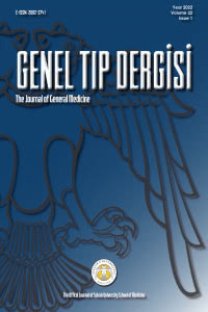Rektal prolapsus nedeniyle rektopeksi yapılan hastalarda operasyondan sonra gelişen kabızlık problemi: 3 farklı vaka
Postoperative constipation problem in the patients performed rectopexy because of rectal prolapse: Three different cases
___
- 1. Stein EA, Stein DE. Rectal procidentia: Diagnosis and management. Gastrointest Endosc Clin N Am 2006;16:189-201.
- 2. Marderstein EL, Delaney CP. Surgical management of rectal prolapse. Nat Clin Pract Gastroenterol Hepatol 2007;4:552-61.
- 3. Felt-Bersma RJ, Cuesta MA. Disorders of the anorectum. Gastroenterol Clin North Am 2001; 30: 199-222.
- 4. Madiba TE, Baig MK, Wexner SD. Surgical management of rectal prolapse. Arch Surg. 2005; 140: 63-73.
- 5. Sobrado CW, Kiss DR, Nahas SC, Araújo SE, Seid VE, Cotti G, et al. Surgical treatment of rectal prolapse: experience and late results with 51 patients. Rev Hosp Clin Fac Med Sao Paulo 2004; 59: 168-71.
- 6. Benoist S, Taffinder N, Gould S, Chang A, Darzi A. Functional results two years after rectopexy. Am J Surg 2001; 182: 168-73.
- 7. Nagle D. Rectal prolapse and fecal incontinence. Prim Care 1999; 26:101-11.
- 8. Watts JD, Rotenberg DA, Buls JG, Goldenberg SM, Nivatongs S. The management of procidentia: 30 years experience. Dis Colon Rectum 1985; 28: 96-102.
- 9. Schultz I, Mellgren A, Dolk A, Johansson C, Holmström B. Long-term results and functional outcome after Ripstein rectopexy. Dis Colon Rectum 2000; 43: 35-43.
- 10. Alaçayır İ, Arslan M, Torun N. Rektal prolapsus. Gastroenteroloji 1992; 3: 731-3.
- 11. Mc Cue JL, Thompson JPS. Clinical and functional result of abdominal rectopexy for complete rectal prolapse. Br J Surg 1991;78:921-3.
- ISSN: 2602-3741
- Yayın Aralığı: 6
- Başlangıç: 1997
- Yayıncı: SELÇUK ÜNİVERSİTESİ > TIP FAKÜLTESİ
M. Ertuğrul KAFALI, Ayşegül BAYIR, Mustafa ŞAHİN, AHMET AK
Aynur KUZUCU, Sadi VİDİNLİSAN, A. Esin KİBAR, FİLİZ EKİCİ, Nursel ALPAN, Hasan Tahsin ÇAKIR
İki farklı yöntemle ölçülen istirahat metabolizma hızlarının karşılaştırılması
Kağan ÜÇOK, Hakan MOLLAOĞLU, Lütfi AKGÜN, Abdurrahman GENÇ
Son veriler ışığında kalp dışı cerrahi öncesi kardiyak değerlendirme
Mehmet YAZICI, Mehmet KAYRAK, Fatih KOÇ
HANDE KÖKSAL, HASAN BOSTANCI, B. Bülent MENTEŞ
MUSTAFA KAPLANOĞLU, Hakan KIRAN, M. Turan ÇETİN
(Editöre not) Deli bal zehirlenmesi
SEDAT KOÇAK, KEZİBAN UÇAR KARABULUT, Mehmet GÜL
Demet KIREŞİ, Mehmet SEVGİLİ, Saim AÇIKGÖZOĞLU, Nazmi ZENGİN
